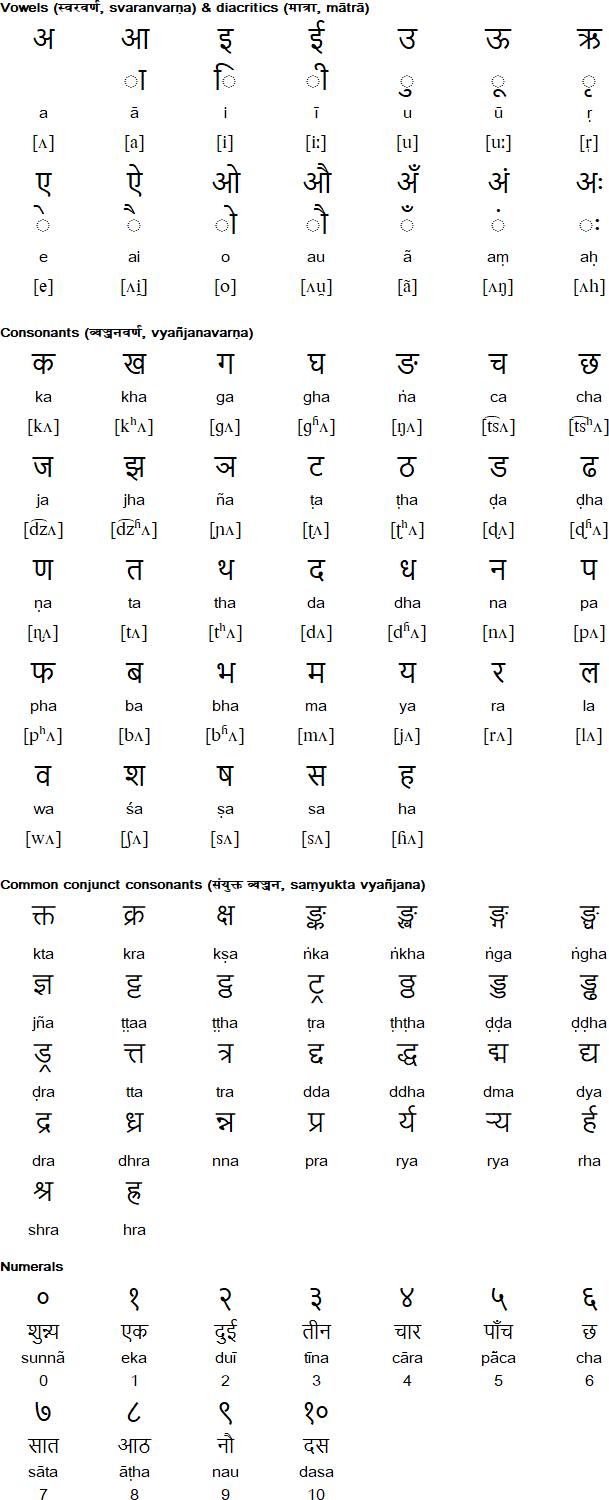Nepali is a member of the Eastern Pahari branch of the Indo-Aryan language family. It is spoken mainly in Nepal and northern India by about 32 million people, 19 million of whom speak it as a native language. Nepali is a statutory national language in Nepal, and about 45% of Nepali people (12.3 million) speak Nepali as their mother tongue, and another 33% (8.6 million) speak it as a second language. It is the main language of government, education and the legal system.
There are about 2.9 million Nepali speakers in India, mainly in the states of Sikkim and West Bengal, where it is a statutory provincial language, and also in the states of Arunachal Pradesh, Assam, Himachal Pradesh, Manipur, Mizoram and Uttarakhand.
Other countries with significant numbers of Nepali speakers include Myanmar, the USA, Bhutan, Australia and the UK. Nepali speakers in Bhutan make up about 35% of the population and are known as Lhotsampa (ལྷོ་མཚམས་པ་).
Historically, Nepali was called Khas Kura (खस कुरा, khasa kurā), spoken by the Khas people of Karnali, and Gorkhali (गोरखाली, gorakhālī), the language of the Gorkha Kingdom, before the term Nepali (नेपाली, nepālī) was adopted. The origin of the modern Nepali language is believed to be from Sinja Valley in Jumla. The Nepali dialect Khas Bhasa (खस भाषा, khasa bhāṣā) is still spoken among the people of the region.
Nepali was first written in the Brahmi script in about 981 AD during the reign of King Bhupal Damupal. From the 12th century, the Devanagari alphabet, which developed from the Brahmi script in the 11th century, became the primary script for Nepali.

Download an alphabet chart for Nepali (Excel)
Hear how to write and pronounce Nepali
सबै व्यक्तिहरू जन्मजात स्वतन्त्र हुन्, ती सबैको समान अधिकार र महत्त्व छ । निजहरूमा विचार शक्ति र सद्विचार भएकोले निजहरूले आपस्तमा भ्रातृत्वको भावनाबाट व्यवहार गर्नुपर्छ ।
Sabai vyaktiharū janmajāta svatantra hun, tī sabaiko samāna adhikāra ra mahattva cha. Nijaharūmā vicāra śakti ra sadvicāra bhaekole nijaharūle āpastamā bhrātṛtvako bhāvanābāṭa vyavahāra garnuparcha.
A recording of this text by Sarthak Sharma
All human beings are born free and equal in dignity and rights. They are endowed with reason and conscience and should act towards one another in a spirit of brotherhood.
(Article 1 of the Universal Declaration of Human Rights)
Details provided by Arvind Iyengar and Arnav Darnal.
Information about Nepali | Phrases | Numbers | Colours | Family Words | Tower of Babel
Information about the Nepali language
http://en.wikipedia.org/wiki/Nepali_language
https://ne.wikipedia.org/wiki/नेपाली_भाषा
https://www.britannica.com/topic/Nepali-language
https://www.ethnologue.com/language/npi
Online Nepali lessons
https://nepalgo.de/
https://nepalilanguage.org/
http://www.nepali.info/nepali/lessons/
https://mylanguages.org/learn_nepali.php
https://bolinepali.com/vocabulary/
https://ilanguages.org/nepali.php
http://learn101.org/nepali.php
https://www.livelingua.com/courses/Nepali/
http://www.digitalhimalaya.com/projectteam/turin/downloads/nepali_primer.pdf
Nepali phrases
https://wikitravel.org/en/Nepali_phrasebook
http://mylanguages.org/nepali_phrases.php
http://www.digitalhimalaya.com/projectteam/
turin/downloads/nepali_primer.pdf
Nepali fonts
http://www.nepali.info/nepali/fonts/
Online news in Nepali Bilaspuri,
Chambeali,
Dogri,
Doteli,
Gaddi,
Garhwali,
Jaunsari,
Jumli,
Kangri,
Kumaoni,
Kullui,
Mahasu Pahari,
Mandeali,
Nepali,
Pangwali,
Sirmauri Aka-Jeru,
Angika,
Athpare,
Avestan,
Awadhi,
Bahing,
Balti,
Bantawa,
Belhare,
Bhili,
Bhumij,
Bilaspuri,
Bodo,
Bhojpuri,
Braj,
Car,
Chamling,
Chhantyal,
Chhattisgarhi,
Chambeali,
Danwar,
Dhatki,
Dhimal,
Dhundari,
Digaro Mishmi,
Dogri,
Doteli,
Gaddi,
Garhwali,
Gondi,
Gurung,
Halbi,
Haryanvi,
Hill Miri,
Hindi,
Ho,
Jarawa,
Jaunsari,
Jirel,
Jumli,
Kagate,
Kannauji,
Kham,
Kangri,
Kashmiri,
Khaling,
Khandeshi,
Kharia,
Khortha,
Korku,
Konkani,
Kullui,
Kumaoni,
Kurmali,
Kurukh,
Kusunda,
Lambadi,
Limbu,
Lhomi,
Lhowa,
Magahi,
Magar,
Mahasu Pahari,
Maithili,
Maldivian,
Malto,
Mandeali,
Marathi,
Marwari,
Mewari,
Mundari,
Nancowry.
Newar,
Nepali,
Nimadi,
Nishi,
Onge,
Pahari,
Pali,
Pangwali,
Rajasthani,
Rajbanshi,
Rangpuri,
Sadri,
Sanskrit,
Santali,
Saraiki,
Sirmauri,
Sherpa,
Shina,
Sindhi,
Sunwar,
Sylheti,
Tamang,
Thakali,
Thangmi,
Wambule,
Wancho,
Yakkha,
Yolmo Page last modified: 10.04.25
[top]
You can support this site by Buying Me A Coffee, and if you like what you see on this page, you can use the buttons below to share it with people you know.
http://www.arghakhanchi.com
https://ekantipur.com/
http://annapurnapost.com/
http://www.bbc.co.uk/nepali/
Pahari languages
Languages written with the Devanāgarī alphabet

If you like this site and find it useful, you can support it by making a donation via PayPal or Patreon, or by contributing in other ways. Omniglot is how I make my living.
Note: all links on this site to Amazon.com, Amazon.co.uk
and Amazon.fr
are affiliate links. This means I earn a commission if you click on any of them and buy something. So by clicking on these links you can help to support this site.
[top]